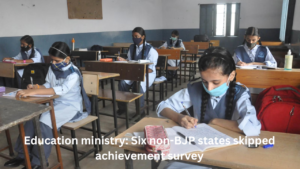On November 3, a survey was conducted with the goal of identifying areas in which teaching and learning in schools need to be improved. (Education Ministry)

According to a statement released by the education ministry on Tuesday, six states that are not BJP-ruled did not take part in the first State Educational Achievement Survey, which was carried out earlier this month by national assessment regulator PARAKH.
On November 3, a survey was conducted with the goal of identifying areas in which teaching and learning in schools need to be improved. The survey also sought to determine baseline performance in the development of competencies at the conclusion of the foundational, preparatory, and middle stages. Additionally, it evaluated the educational proficiency of students in grades 3, 6, and 9 at the block level.
This comprehensive survey was conducted across 5,917 blocks in the country, encompassing about 80 lakh students from 3 lakh schools. Additionally, it consists of over 3 lakh field investigators and 6 lakh teachers.Every State and Union Territory, with the exception of Chhattisgarh, Delhi, Odisha, Punjab, Rajasthan, and West Bengal, took part in the survey’s implementation, according to a ministry statement.
When HT tried to get a response from a Delhi government spokesperson, they did not respond right away.
The ministry said in a statement that the survey was carried out using OMR technology and pen and paper.

The State Educational Achievement Survey 2023 will provide vital information about the system’s strengths and possible areas for improvement if it is carried out successfully. Sanjay Kumar, secretary of the ministry of education’s school education division, stated in a statement that these insights “will form the bedrock for evidence-based policies and initiatives directed towards enriching the quality of education for the students.”
The recent reports from the Education Ministry have unveiled an intriguing pattern in the participation of states in the National Achievement Survey. Surprisingly, six states governed by parties other than the BJP have chosen to abstain from this comprehensive evaluation. The survey, aimed at assessing the learning levels of students across various grades, serves as a crucial benchmark for educational standards nationwide. However, the decision of these states to skip this assessment has sparked debates and discussions regarding the reasons behind their reluctance to partake in this vital educational exercise.
Uttar Pradesh, Bihar, Maharashtra, West Bengal, Tamil Nadu, and Kerala, each under the governance of political parties not affiliated with the Bharatiya Janata Party, have taken a bold step by opting out of the National Achievement Survey. The absence of these states, which collectively hold a significant portion of the country’s student population, raises concerns about the comprehensiveness and accuracy of the survey findings. The decision not to participate seems to be underlined by varying reasons and ideologies prevalent in each of these states’ educational policies.
In Uttar Pradesh, the government has been vocal about prioritizing localized assessments over national surveys. The state leadership asserts that tailored evaluations are better suited to understand the educational landscape within Uttar Pradesh accurately. Conversely, Bihar’s decision appears to stem from the state’s ongoing educational reforms, which, according to state officials, necessitate a focused approach that aligns with their specific developmental strategies.
Maharashtra, a state known for its diverse educational system, has cited logistical challenges and concerns regarding the survey’s methodology. Meanwhile, West Bengal has raised objections related to the survey’s structure, claiming it might not holistically represent the state’s educational dynamics due to its distinct curriculum and teaching methodologies.
Tamil Nadu, recognized for its emphasis on language and cultural heritage in education, has opted out, expressing reservations about the survey’s ability to capture the nuances of their educational framework. Kerala, with its acclaimed literacy rates and unique pedagogical approaches, has also chosen not to participate, highlighting the need for a more localized and contextual assessment.
The decision of these states has triggered a national dialogue, prompting discussions about the federal structure and autonomy of states in shaping their educational policies. While some laud these states for asserting their autonomy and advocating for tailored assessments, others express concerns about the potential impact on the national understanding of educational standards and the effectiveness of comparison across states.
Critics argue that the absence of these populous states may create a void in the survey results, impacting the overall analysis of the country’s educational scenario. Moreover, the credibility and effectiveness of the survey as a tool for policymaking and resource allocation might be hindered by the absence of key contributors to the nation’s student demographics.
In response to these developments, the Education Ministry has emphasized the importance of a collective effort in ensuring a comprehensive evaluation of the country’s educational landscape. The Ministry has extended invitations to these states, urging them to reconsider their decisions and participate in the survey, emphasizing the significance of a unified approach in understanding and addressing the challenges within the education sector.
As the discourse continues, the divergent viewpoints and reasons behind the non-participation of these states in the National Achievement Survey underscore the complex interplay between federal autonomy and national assessment frameworks. The resolution of these differences holds implications not only for the survey but also for the larger discourse surrounding educational policies and the collaborative pursuit of enhancing learning outcomes for all students across the diverse educational spectrum in India.

